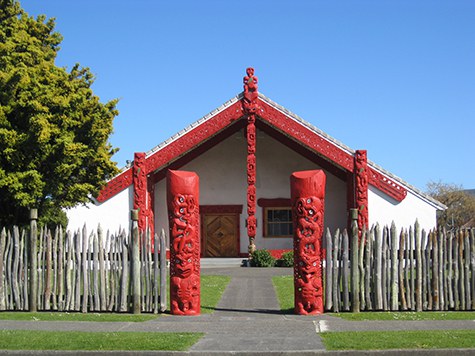E nui ana te wero ki a mātou
 The kaupapa for our September forum was Ka Kotahitanga Tikanga: Working with Integrity with Māori. The speakers were both impressive wāhine Māori – Dr Charlotte Severne (Ngāti Tūwharetoa, Ngāi Tūhoe) is the recently appointed Māori Trustee and Chief Executive of Te Tumu Paeroa. Professor Rawinia Higgins (Ngāi Tūhoe) is Chair of the Māori Language Commission and Deputy Vice-Chancellor (Māori) at Victoria University.
The kaupapa for our September forum was Ka Kotahitanga Tikanga: Working with Integrity with Māori. The speakers were both impressive wāhine Māori – Dr Charlotte Severne (Ngāti Tūwharetoa, Ngāi Tūhoe) is the recently appointed Māori Trustee and Chief Executive of Te Tumu Paeroa. Professor Rawinia Higgins (Ngāi Tūhoe) is Chair of the Māori Language Commission and Deputy Vice-Chancellor (Māori) at Victoria University.
The chair for our forum was Karen Coutts (Ngāi Tahu, Te Aitanga-a-Māhaki), who is one of the Directors of Transparency International New Zealand. Karen framed the coming conversation by reminding everyone about the importance of our unique constitutional arrangements here in Aotearoa – a model provided for in te Tiriti o Waitangi and its foundational principle of partnership.
In Karen’s view, public sector leaders need to ensure they bring genuine integrity and commitment to working in partnership with Māori and iwi, and doing so is key to achieving transparent and accountable government. What has happened instead, she said, is that tangata whenua have had to fight over the years for Treaty rights that ought to have been freely acknowledged, and Māori have consequently struggled for their fair share of recognition and redress under the Treaty.
This topic is not an easy one for some tauiwi, but it’s also exactly the right conversation to be having. So what’s been going wrong?
When Charlotte spoke, she started with a recap of what the Māori Trustee does – reminding us her organisation manages over 90,000 hectares of Māori land on behalf of nearly 100,000 people. It’s a big responsibility and Charlotte’s agency works hard to support Māori to make the most of their land.
In turn, Charlotte is often asked to engage with various different pieces of proposed legislation or policy that impact on te whenua Māori. By email. Without warning. And without any discussion about how the proposal might affect Māori landowners or be of use to them. Charlotte described the requests to engage as always “polite” - identifying her or her agency as a special stakeholder and respectfully asking how they would like to be involved. But what is almost always missing is what Charlotte described as the “Māori analytics” – a description of what the consulting agency already knows about the Māori Trustee, its work and the people who it acts as trustee for. Information about who the consulting agency has already spoken to, and what they said about the proposal? What analysis has already been done about the impact of the proposal on Māori land? Where, in the one hundred or so pages of information, will Charlotte find the section that she really needs to hone in on? She referred to screeds of pages that say “all the right things but tell me nothing”.
Why, asked Charlotte, are people so wary of picking up the phone? Be brave, she implored us. Just call. Sometimes the conversations can be a bit scary, but they are important because they support a bigger purpose – an ethical and open conversation. A genuine partnership.
Rawinia had some fascinating insights to share too – reflecting on her role at the university and some of the assumptions she sees people making about engaging with Māori. Like asking Māori to engage on issues for free or take on extra responsibilities on the assumption that they will do so because of the importance of the issue. Or assuming that Māori will have the same priorities and will always want to engage on the same issues as others. She described a volcanologist taken aback that an iwi group were less interested in supporting his research on whether the volcano under their lake might erupt, and much more interested in how to use geothermal power in their homes and businesses.
Rawinia stressed that we shouldn’t ever assume that our priorities will be the priorities of others. The interests of iwi are diverse; the infrastructure available to iwi is highly variable; the history is different. Too often, as well, she sees a short-term focus from government, seemingly based around election cycles, where Māori will often be more interested in engaging on issues that will make a difference to future generations.
Most public servants I know want to do the right thing. They are genuine about engaging with Māori in an open way, and in a spirit of partnership. And new leadership is being expressed through the revamped Office for Crown Māori relations, Te Arawhiti. But Charlotte and Rawinia’s messages gave me pause – are agencies always going about that in the best way? It’s important that “co-design” doesn’t become another term for consultation, when a view has already been reached about the best way forward. Agencies need to make sure they enable Māori and iwi to prioritise what they engage on – so they don’t reach saturation point and can focus on things that matter to tangata whenua, not just those that matter to government.
And finally – a small but significant change everyone can make – sometimes we need to pick up the phone, or find other ways to have a direct and personal conversation, before sending that polite and proper email into the ether. Especially at this Leaders’ Integrity Forum, I was reminded of the wisdom from te ao Māori: Ko te kai a te rangatira he kōrero (The food of chiefs is dialogue).
